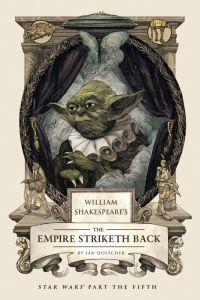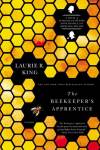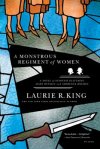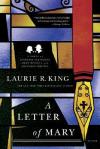 Before I get into this review, I should probably give a couple of warnings:
Before I get into this review, I should probably give a couple of warnings:
Long-time readers of That’s What She Read can probably glean two things: 1) That I really make every attempt to not discuss politics in any way, shape or form while discussing a book, and 2) that in the rare instance I do, I probably lean liberal. (The .gifs from The Daily Show most likely add to that indication.)
Having said that, this book is going to be tough for me to discuss in a neutral fashion. Because while I have read this book before, it really wasn’t on my radar to read again — until the Hobby Lobby decision. And I realize that my timing to discuss that topic is poor – between the Gaza/Israeli conflict, John Boehner suing the President, and who knows what’s happened since I went to bed last night, the Hobby Lobby decision and its aftermath are probably far from near everyone’s minds.
So, here’s how I’m going to “discuss” this book: I’m going to give you as much of the plot as I can without spoilering people. Then I’m going to give you a ton of quotes that struck me about the situation going on in this book, and hopefully, I’ll be able to point out a couple of topics from the book that are safe to discuss.
Because look: it’s a tough subject. I get that. And in real life, there are some major things that need to happen so that Jon Stewart no longer grits his teeth as he’s closing the first act. But this blog is for book discussion, not political discussion. So if you want to comment and start a fight with me over some of the issues here, you best be pointing out that I should have used “metonymy” instead of “metaphor,” because if you are going to try and fight with me on women’s issues on my book blog, you got another think coming.
And with that, let’s get into The Handmaid’s Tale.
The book takes place in a near future, though it was written in 1986 – that becomes important. We learn the setting is sometime after the turn of the twentieth century, but there are no markers to tell us how far into the twenty-first it is. The planet (and the United States especially) has been ravaged by nuclear explosions and pollution; in addition, there is made a link (possibly quite specious, but again, I might get into that in a minute) between birth control and infertility.
This sets the stage for a massive coup:
It was after the catastrophe, when they shot the president and machine-gunned the Congress and the army declared a state of emergency. They blamed it on the Islamic fanatics, at the time.
Keep calm, they said on television. Everything is under control.
I was stunned. Everyone was, I know that. It was hard to believe. The entire government, gone like that. How did they get in, how did it happen?
That was when they suspended the Constitution. They said it would be temporary. There wasn’t even any rioting in the streets. People stayed home at night, watching television, looking for some direction. There wasn’t even an enemy you could put your finger on. [p. 174]
This state of emergency allows this nameless group (it becomes clear it is not an Islamic faction) to create a new country called Gilead, and it is heavily based on a Biblical culture. Their reading of that text is both literal and radical, and what they do is take away everyone’s rights, but create a new theocracy, enslaving women.
First, they take away their bank accounts – all the money they’ve earned and saved gets automatically transferred to their husband’s account (or male next-of-kin, if they’re unwed). Then, they make it illegal for women to work or own property, essentially keeping them in their home. Then, they make second marriages and divorces illegal, and if you have a child in that second marriage, you are deemed unfit and your child is taken from you.
Then come the Handmaids.
If you were able to have a child (and one of the women who committed adultery or a second marriage), you are conscripted into the Handmaids. Taken from a verse in the Bible:
And when Rachel saw that she bare Jacob no children, Rachel envied her sister; and said unto Jacob, Give me children, or else I die.
And Jacob’s anger was kindled against Rachel; and he said, Am I in God’s stead, who hath withheld from thee the fruit of the womb?
And she said, Behold my maid Bilhah, go in unto her; and she shall bear upon my knees, that I may also have children by her. [Genesis 30:1-3]
[Thank you, epigraph! Because the only knowledge I have from the Bible, I got from Lamb: The Gospel According to Biff, Christ’s Childhood Pal and Raiders of the Lost Ark.]
The women who are able to bear children and have proven to do so before this culture are sent to the Rachel and Leah center, where they are taught that this servitude will protect them. They are conscripted to Commanders and other high male officials, and their job is to conceive them a child. But not through in-vitro fertilization, no: they must have sex with the men while their Wives are present – “she shall bear upon my knees.” The Handmaid has three years to conceive, then she moves to another house to try again. If she is able to bear a healthy child – because birth defects are also prevalent – she still moves to another house to try again.
How are they able to convince these intelligent women that this is an appropriate new world order? Through lies of safety and persecution. In this new culture, everyone has a uniform tied to their role in society: Wives wear blue gowns, Handmaids wear red. Handmaids also have huge veils – blinkers, essentially – to keep them from straying from their proscribed path and from interacting with others. Marthas, who are basically maids and servants in upper-class households, wear green. Aunts were women who ran the Rachel and Leah center: they indoctrinated the Handmaids and furthered propaganda to get them to come around to their way of thinking. Aunts wore khaki.
A person’s color of dress immediately designates where they fit into this society.
Going back to the propaganda, here’s an example of how thinking was changed:
I’m remembering my feet on these sidewalks, in the time before, and what I used to wear on them. Sometimes it was shoes for running, with cushioned soles and breathing holes, and stars of fluorescent fabric that reflected light in the darkness. Though I never ran at night; and in the daytime, only beside well-frequented roads.
Women were not protected then.
I remember the rules, rules that were never spelled out but that every woman knew: Don’t open your door to a stranger, even if he says he is the police. Make him slide his ID under the door. Don’t stop on the road to help a motorist pretending to be in trouble. Keep the locks on and keep going. If anyone whistles, don’t turn to look. Don’t go into a laundromat, by yourself, at night.
I think about laundromats. What I wore to them: shorts, jeans, jogging pants. What I put into them: my own clothes, my own soap, my own money, money I earned myself. I think about having such control.
Now we walk along the same street, in red pairs, and no man shouts obscenities at us, speaks to us, touches us. No one whistles.
There is more than one kind of freedom, said Aunt Lydia. Freedom to and freedom from. In the days of anarchy, it was freedom to. Now you are being given freedom from. Don’t underrate it. [p. 24]
Our narrator is Offred – oh that’s right. In this culture, if you’re a Handmaid, your name is taken away and assigned to your Commander – Offred, Ofglen, Ofwarren. So Offred is on her last assignment, and her Commander’s Wife is anxious to have a baby. Offred’s walking partner to the market is Ofglen. Meanwhile, Offred is plagued by memories of her daughter, taken from her because while her marriage to Luke was her first, she was Luke’s second wife. They tried to escape when things started getting bad, but they were found out at the border. Her daughter was taken away, she was taken to be a Handmaid, and she has no idea what happened to Luke.
Her best friend, Moira was in the Center with her, but Moira escaped. She has no idea where she ended up.
Offred does her duties, though she struggles with her remaining streak of independence. Then one night, she is called into the Commander’s study. Handmaids are not supposed to consort with men of any sort, even their Commander outside of their Ceremony. She doesn’t know what to expect, but the Commander just wants to play Scrabble with her. This is a huge treat, because women are also not allowed to read or write any longer. Then he escalates into letting her read old magazines, which were supposed to have all been burned.
Then he takes her to Jezebel’s, which is a big hotel where high-ranking male officials go to have anonymous sex with whores for free.
“I thought this sort of thing was strictly forbidden,” I say.
“Well, officially,” he says. “But everyone’s human, after all.”
I wait for him to elaborate on this, but he doesn’t, so I say, “What does that mean?”
“It means you can’t cheat Nature,” he says. “Nature demands variety, for men. It stands to reason, it’s part of the procreational strategy. It’s Nature’s plan.” I don’t say anything, so he goes on. “Women know that instinctively. Why did they buy so many different clothes, in the old days? To trick the men into thinking they were several different women. A new one each day.”
He says this as if he believes it, but he says many things that way. Maybe he believes it, maybe he doesn’t, or maybe he does both at the same time. Impossible to tell what he believes.
“So now that we don’t have different clothes,” I say, “you merely have different women.” This is irony, but he doesn’t acknowledge it.
“It solves a lot of problems,” he says, without a twitch. [p. 237]
While this is going on, the Commander’s Wife has arranged to have Offred sleep with Nick, the chauffeur, in an effort to speed her conception along.
The end of the book is actually a speech from a college lecture on the Gileadean society, given in the year 2195. It sheds more light on the culture changes and what happened or may have happened to Offred.
There – I think I did all right without getting political. So, here come more quotes, most likely out of context and open to your own interpretation.
A description of Offred’s room:
A window, two white curtains. Under the window, a window seat with a little cushion. When the window is partly open – it only opens partly – the air can come in and make the curtains move. I can sit in the chair, or on the window seat, hands folded, and watch this. Sunlight comes in through the window too, and falls on the floor, which is made of wood, in narrow strips, highly polished. I can smell the polish. There’s a rug on the floor, oval, of braided rags. This is the kind of touch they like: folk art, archaic, made by women, in their spare time, from things that have no further use. A return to traditional values. Waste not want not. I am not being wasted. Why do I want? [p. 7]
A return to traditional values. That’s how this culture shift started.
[It] used to be a movie theater, before. Students went there a lot; every spring they had a Humphrey Bogart festival, with Lauren Bacall or Katherine Hepburn, women on their own, making up their minds. They wore blouses with buttons down the front that suggested the possibilities of the word undone. These women could be undone; or not. They seemed to be able to choose. We seemed to be able to choose, then. We were a society dying, said Aunt Lydia, of too much choice. [p. 25]
One of the places the Handmaids can go on their daily walks is The Wall, where the Eyes (the police force, essentially) hang the bodies of the criminals they’ve executed, as reminders.
The men wear white coats, like those worn by doctors or scientists. […] Each has a placard hung around his neck to show why he has been executed: a drawing of a human fetus. They were doctors, then, in the time before, when such things were legal. Angel makers, they used to call them; or was that something else? They’ve been turned up now by the searches through hospital records, or – more likely, since most hospitals destroyed such records once it became clear what was going to happen – by informants: ex-nurses perhaps, or a pair of them, since evidence from a single woman is no longer admissible; or another doctor, hoping to save his own skin; or someone already accused, lashing out an an enemy, or at random, in some desperate bid for safety. Though informants are not always pardoned.
These men, we’ve been told, are like war criminals. It’s no excuse that what they did was legal at the time; their crimes are retroactive. They have committed atrocities and must be made into examples, for the rest. Though this is hardly needed. No woman in her right mind, these days, would seek to prevent a birth, should she be so lucky as to conceive. [p. 32-33]
This seems like such a sad world. Is there nothing funny?
I hear something, inside my body. I’ve broken, something has cracked, that must be it. Noise is coming up, coming out, of the broken place, in my face. Without warning: I wasn’t thinking about here or there or anything. If I let the noise get out into the air it will be laughter, too loud, too much of it, someone is bound to hear, and then there will be hurrying footsteps and commands and who knows? Judgment: emotion inappropriate to the occasion. The wandering womb, they used to think. Hysteria. And then a needle, a pill. It could be fatal. [p. 146]
Oh, okay then.
One of the stores in the town is Soul Scrolls, where Commanders’ Wives can order prayers to be read.
Ordering prayers from Soul Scrolls is supposed to be a sign of piety and faithfulness to the regime, so of course the Commanders’ Wives do it a lot. It helps their husbands’ careers. [p. 167]
There’s a quick reference to The Sabine Women, a picture of which is depicted in one of the Commander’s books Offred looks through. I’d recommend reading the Wikipedia page for that if you’re interested in looking at parallels.
Two quick notes about marriages, then two more points to make, and then I’m done (I promise).
First note: marriages are arranged in this new society, and marriages occur as part of a public ceremony:
And now the twenty veiled daughters, in white, come shyly forward, their mothers holding their elbows. It’s mothers, not fathers, who give away daughters these days and help with the arrangement of the marriages.
[…] They’ll always have been in white, in groups of girls; they’ll always have been silent. [p. 219]
And flashing back to Offred’s marriage to Luke, before it was canceled:
We still have … he said. But he didn’t go on to say what we still had. It occurred to me that he shouldn’t be saying we, since nothing that I knew of had been taken away from him.
[…] We are not each other’s, anymore. Instead, I am his. [p. 182]
Point number one: one of the themes I saw running through the book is the envy everyone has of everyone else. Offred envies the Marthas’ ability to use knives. The Marthas envy Offred because she can leave the house. Offred’s Wife envies Offred because Offred will be the one to give the Commander a child. Offred envies the Commander’s Wife for her freedom to do other things. It all goes right back to the Bible quote: Rachel envied her sister. Envy is prevalent in this society, and it appears to be the one sin the new regime has neglected to eradicate.
Point number two: rape culture. During the indoctrination process, much is made about how “bad” it was “before,” through heightened language and hyperbole. Now, I, Alaina, am not saying we don’t have a problem with rape culture. Far from it. This current society in 2014 has a definite problem with rape culture – as evidenced here, by one of my heroes, Jessica Williams of The Daily Show fame. But it’s also a bad thing to make women think the world is even worse than it is.
Having said that:
Modesty is invisibility, said Aunt Lydia. Never forget it. To be seen – to be seen – is to be – her voice trembled – penetrated. What you must be, girls, is impenetrable. She called us girls. [p. 28]
And I can’t find a more horrifying example than this:
It’s Janine, telling about how she was gang-raped at fourteen and had an abortion. She told the same story last week. She seemed almost proud of it, while she was telling. It may not even be true. At Testifying, it’s safer to make things up than to say you have nothing to reveal. But since it’s Janine, it’s probably more or less true.
But whose fault was it? Aunt Helena says, holding up one plump finger.
Her fault, her fault, her fault, we chant in unison.
Who led them on? Aunt Helena beams, pleased with us.
She did. She did. She did.
Why did God allow such a terrible thing to happen?
Teach her a lesson. Teach her a lesson. Teach her a lesson.
[…] This week Janine doesn’t wait for us to jeer at her. It was my fault, she says. It was my own fault. I led them on. I deserved the pain.
Very good, Janine, says Aunt Lydia. You are an example. [p. 71-72.]
Merriam-Webster’s dictionary defines “feminism” as “the belief that men and women should have equal rights and opportunities.” Do I believe that our current society has equal rights and opportunities for men and women? No. I see it in how news media wonders if Hillary Rodham Clinton’s impending grandmother-dom was a strategy designed to make her more appealing to voters in the 2016 presidential race, and yet no one cares whether the male candidates are grandfathers. I see it in how colleges teach their female students on how to avoid being raped but neglect to teach either gender that rape is wrong and shouldn’t be done. I see it in how a privately-held corporation can be allowed to not provide health care benefits that affect a woman’s reproductive system because they (erroneously, against scientific proof) believe that those birth controls cause abortions, and yet Viagra and vasectomies are both covered in full.
What The Handmaid’s Tale shows us is a warped version of women’s culture:
You wanted a woman’s culture. Well, now there is one. It isn’t what you meant, but it exists. Be thankful for small mercies. [p. 127]
What goes unsaid is this women’s culture was one shaped by men. It is a man’s interpretation of a woman’s culture: women are subservient to men (not equal), yet given certain powers (pregnancy and birth is revered and in the house of women; male doctors only interfere if the natural birth proves tricky). They hold no office of political power; they are also not allowed to read or write.
This is a twisted ideal of a women’s culture. And remember, this book was published in 1986. This women’s culture is within our near future.
How do you feel now?
Grade for The Handmaid’s Tale: 5 stars.





 Before I get into this review, I should probably give a couple of warnings:
Before I get into this review, I should probably give a couple of warnings: